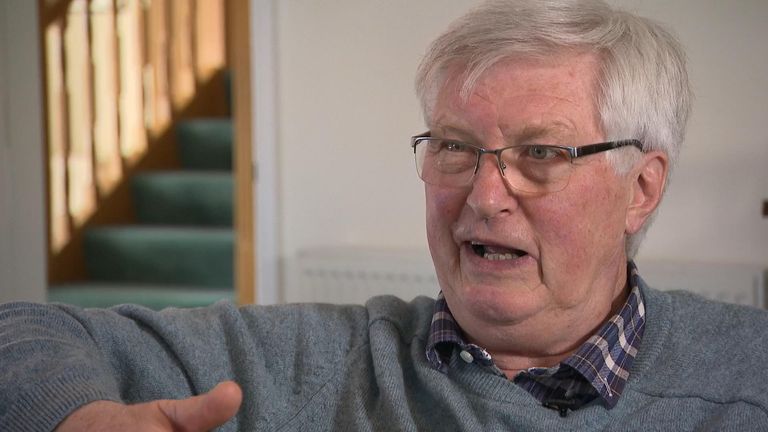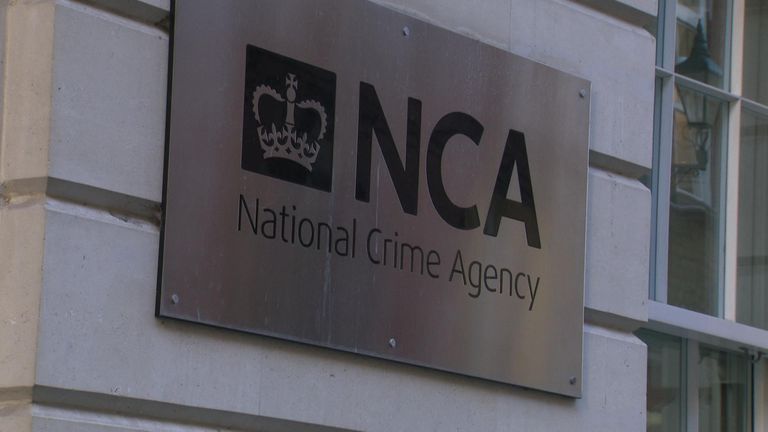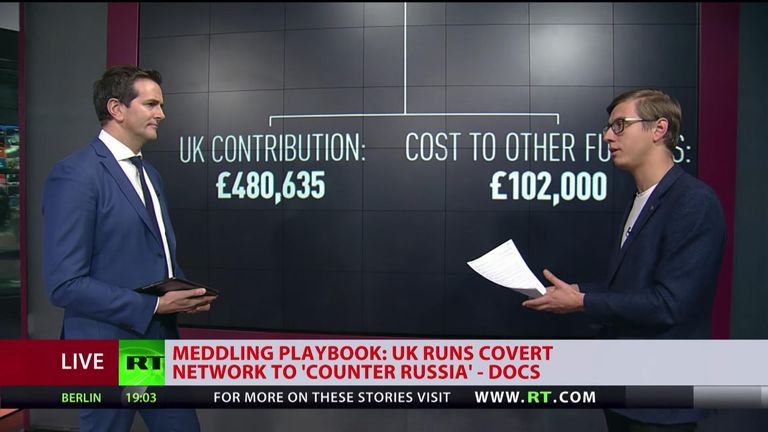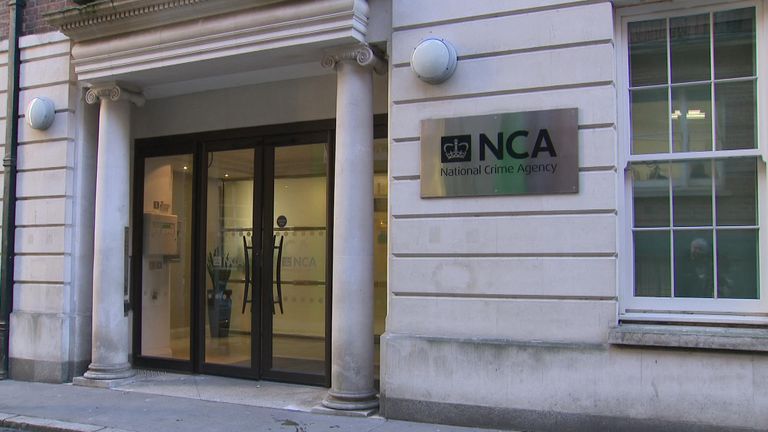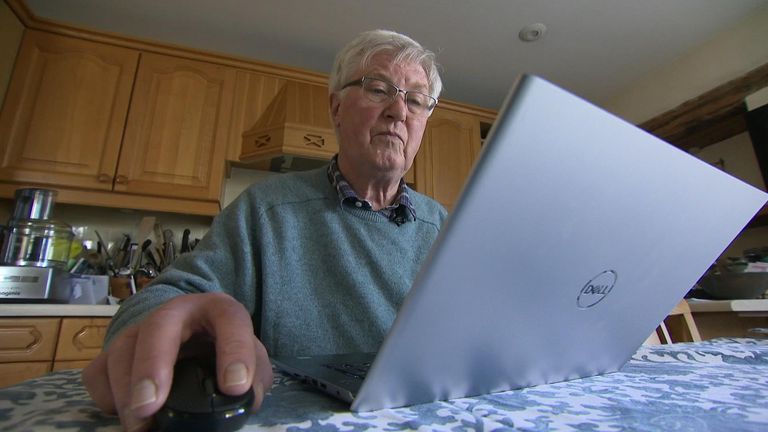‘Highly likely’ GRU hacked UK institute countering Russian fake news
The National Crime Agency is leading an investigation into a suspected cyber attack on a British institute that seeks to counter Russian disinformation, Sky News can reveal.
Whitehall sources said it is highly likely that Russia’s military intelligence service carried out the hack-and-leak of files from the little-known Institute for Statecraft.
The move may have been in response to Britain implicating the GRU in the Salisbury spy poisoning last year and pledging to “shine a light” on the agency’s covert activities, they said.
Security officials regard the attack as significant because – if confirmed – it would mark the first time Russia has conducted a hack-and-leak operation in Britain, a separate source said.
The GRU is suspected of deploying such a tactic against the Democratic National Committee in the 2016 US presidential elections and against the World Anti-Doping Agency.
Chris Donnelly, a former senior Ministry of Defence civil servant who co-founded the Institute for Statecraft, said he has little doubt who hacked it, though he has no “forensic proof”.
“Our assessment… is that this is the GRU,” Mr Donnelly, 72, told Sky News in an interview.
He said the launch of the investigation by the National Crime Agency, elite law enforcement with the power to investigate cases with an overseas dimension, is important.
It “demonstrates that the government clearly considers this to be a significant attack by a hostile foreign power against the UK,” Mr Donnelly said.
But Dmitry Peskov, President Vladimir Putin’s spokesman, denied any Russian involvement.
“We have been saying numerous times that Russian state has nothing to do with any cyber attacks, to the contrary we have been offering international cooperation to combat cyber-crime but unfortunately we met no reciprocity from our counterparts,” Mr Peskov said in an emailed response to a question about the allegations.
Files stolen from the institute – registered in Scotland as an educational charity but based in London and with about 12 staff – have been leaked online every few weeks since November.
Kremlin-funded media outlets have used the leaks to accuse Britain of conducting “shadowy” information operations to stoke anti-Russian sentiment around the world.
A number of individuals – including institute staff – have had their names, bank details, home addresses and other private information leaked as part of the attack.
One said he suspected intruders had on a number of occasions broken into his home and moved objects around, including miniature figurines on a shelf.
He called the suspected home intrusions a concern but said this is the kind of tactic the Russian security services use against certain foreign diplomats, military personnel, journalists and others living in Moscow.
“It’s all part of the bigger game of exerting psychological pressure to unsettle, deflect, divert focus,” the institute employee said, asking to remain anonymous.
Mr Donnelly, who speaks Russian and is an expert on the Kremlin and Russian military strategy, said the hackers used sophisticated techniques, not leaving behind easy-to-spot tracks, which he said was a further indication of a Kremlin-sponsored attack.
“The only thing that makes sense is this is a Russian state attack against what we are doing,” he said, speaking from his home in Cumbria.
The National Cyber Security Centre, part of GCHQ, has been investigating the suspected hack since late last year. The NCA’s involvement began in recent weeks.
An entity that calls itself Anonymous, but offers no proof of being affiliated with the worldwide group of activist hackers, uploaded the stolen files on a third party website.
The first of six dumps was in early November. The most recent one was in early February.
They focus on an institute programme called the Integrity Initiative, which Mr Donnelly said aims to combat and raise awareness about disinformation used by Russia and others, including China and the Islamic State group, in Europe and elsewhere.
The programme has received more than £2.2m in funding over the past two years from the Foreign and Commonwealth Office, which is keen to expose fake news and propaganda being used by hostile states as a weapon to harm democratic societies.
The leak was first reported in late November by Sputnik, a Russian state-funded news outlet, under the headline: “Anonymous reveals covert UK special ops on hybrid warfare in EU”.
The Russian state broadcaster RT also carried the story on the same day – 23 November – declaring: “Anonymous blows lid off huge psyop in Europe and it’s funded by UK and US.”
Both media organisations have since reported extensively on what they describe as a “scandal”, claiming they reveal murky British meddling in other countries’ affairs and even suggesting the institute played a role in the nerve agent attack on the Skripals.
The reports include suggestions that journalists, including myself, are improperly associated with the Integrity Initiative because our names feature in the leaked files.
The Labour Party was also caught up in the fallout after it emerged the Integrity Initiative had used Twitter to retweet a small number of posts that were hostile to Jeremy Corbyn. The institute has since apologised.
Emily Thornberry, the shadow foreign secretary, summoned a Foreign Office minister to answer questions on the issue, while Chris Williamson, who has since been suspended from the party over unrelated remarks he made over an antisemitism row, appeared a number of times on RT to criticise the overall work of the Integrity Initiative.
The leaks attracted the attention of some commentators, bloggers and academics.
A group called the Working Group on Syria, Propaganda and Media, which includes four British university professors, produced a report accusing the institute of “covert manipulation of the public sphere, including campaigns to smear and suppress dissenters”.
Mr Donnelly said the hacked files are being misinterpreted to create a deliberately false impression of the institute.
He said his organisation, which he described as a “think-tank and a do-tank” is independent and has never received instructions from the government.
The allegations of black propaganda better describe what Moscow is guilty of in terms of spreading anti-Western disinformation, Mr Donnelly said.
He believes the institute was targeted because Russia was nervous about the impact it was having in creating groups – called “clusters” – of informed individuals in countries across Europe that were able to call out and reduce the effect of Russian disinformation.
“You have to understand that from the perspective of Putin and his colleagues and the whole of the Russian defence and security apparatus, they are at war with us,” Mr Donnelly said.
“We in the UK and in Europe find this really hard to believe but that is because we can’t see things through their eyes. Putin has had to make the West his enemy to keep himself in power and justify his position.”
Sir Alan Duncan, the minister for Europe, said the suspected hack followed the pattern of previous cyber attacks linked to Russia but he would not be drawn on attribution.
Asked why he thought the institute was targeted, he said: “It was targeted probably because it’s doing some good things. And it’s clearly got under Russia’s skin. So they’re fighting back and trying to discredit it using a useful idiot like Chris Williamson.”
The minister also turned on the four professors – Professor Tim Hayward and Professor Paul McKeigue from the University of Edinburgh, Professor David Miller from the University of Bristol and Professor Piers Robinson from the University of Sheffield.
“These academics dotted around the UK who, whenever there is something pro-Russian, row in behind it in a co-ordinated way,” he said.
“We should not be taken for a sucker. We should realise what these people are doing together against our interests and against the interests of democracy more widely.”
Asked about Sir Alan’s allegations, Professor Robinson replied: “The briefing notes that we have written …on the Integrity Initiative have been carefully researched and supported in detail by references to original sources.
“If Sir Alan Duncan or anyone else believes that they can rebut these, we would welcome criticisms that show, with evidence, where we are wrong…. Sir Alan’s assertion that we are ‘working against democracy’ is beneath contempt.
“We note that last December in response to a question about the Integrity Initiative from the shadow foreign secretary he misled the House of Commons.”
Source: Read Full Article
